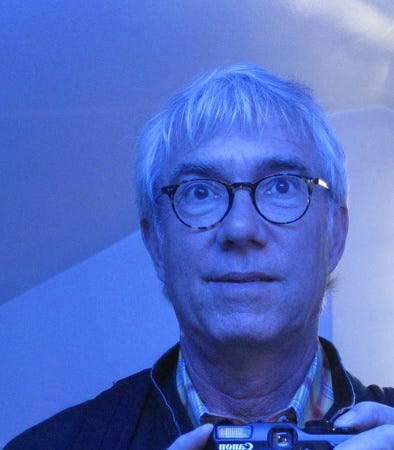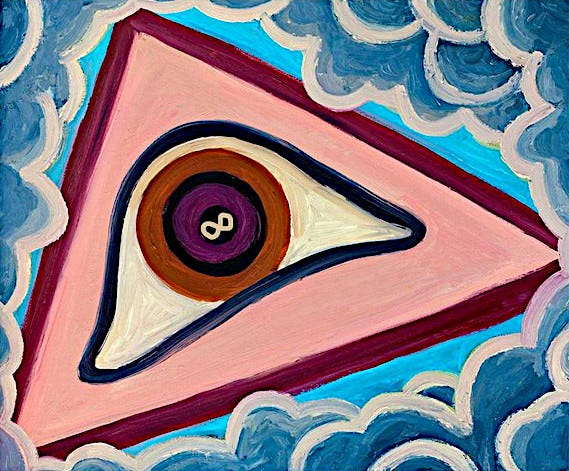Writer, coder, mathematician, artist… You’ve been busy. What are you, really?
I’m tank-grown from a human egg and a strand of pemmican from the great Thutmosis. Lacking today’s head-freezing tech, the pharaoh’s court immortalized the god-king by curing him like beef jerky. A wayward Berlin chef served a cutlet from the mummy’s thigh to the philosopher Georg Wilhelm Friedrich Hegel shortly after he completed his epic The Phenomenology of Mind. The young philosopher pronounced the dish unspeakably toothsome, indescribably loathsome, and—visionary that he was—he said he detected a hint of Ruckling. Picking a strand of mummy from between his teeth, Hegel pressed it to dry upon a page of his diary, which eventually passed into my mother’s hands.
Fast forward to the detonation of two atomic bombs over Japan, and the concomitant appearance of seven UFOs. My titular father and my egg-mother decanted me into a glass-lined golf bag in a locker in the Louisville Country Club. On March, 22, 1946, in fear and awe, I woke into life’s long dream.
My career has been a series of category mistakes and lunges for enlightenment, a haze of amaze. I’ve worked as a swine herd, a theologian, a fishmonger, an anvil, and none of the above. I wrote, sometimes in English, sometimes in computer code, sometimes in smears of paint, sometimes in symbols and diagrams. In this interview, I achieve a fleeting apotheosis.
In the context of dreampunk, should we extend the term “dreams” to include altered states of consciousness such as psychedelic trips, mystic visions, paranoid delusions, and the like?
Stick to your guns, Cliff, be hardcore, focus on writing about actual dreams. Trips, visions, or delusions are fake dreams. Keep in mind that the stars are always out, even at noon. We only think we don’t see them because the sun drowns them out. But maybe at some level we do see the daylight constellations. You dream all day long, man, all the time. It never stops. Your rational mind is a dream as well—but that dream is of little interest to a dreampunk, eh?
As virtual reality tech continues to advance along with our understanding of (and ability to manipulate) the brain, do you see an overlap in the near future between VR and dreaming?
That’s an interesting point. Superficially, dreams and VR seem similar, in that they’re both illusions. And certainly there could be a type of SF story where someone is being fed a VR sim, and they think it’s a dream. And in a full-on commercial dystopia, you’d have VR ads and propaganda shuffled in with your dreams all night long.
This said, I think we drastically overestimate the quality of our present and future VR. The physical world is very much richer than anything that’s going to come out of a computer sim. Never forget that a physical computation is taking place on, like, an octillion atoms, and it’s been running full-on for hundreds of millions of years, and it’s got layer upon layer of detail.
The hype says VR interesting and, like, my back yard is dull. But the yard has dirt and ants and pill-bugs and roots, and sometimes it rains. Not very often does it rain in California. But I have sprinklers. And a hose. You can’t get wet or dirty in VR.
But never mind that. Maybe, for the purpose of hoodwinking a dreamer, a VR doesn’t have to be all that physically accurate. Okay fine, but there’s another issue: dreams aren’t very much like either VR or daily life at all. What are dreams like? This is one of the issues that dreampunk might explore, and it’s something I’d like to write about. The answer isn’t obvious.
It’s very rare that I have a dream where I’m looking out over a large, fully-rendered 3D space. If there’s a big space, I’m focusing on a collage of zoomed-in cameos. Dreams tend not to be very visual. It’s more like there are entities in a dream, and I know where they are, and I can focus on them, but I’m dealing with my thoughts and emotions about the things in the dream—as opposed to experiencing them as CG sims in a Euclidean space.
So, no, the characters in a dream aren’t like talking heads on TV. They’re more like sly, eyeless, lamprey-like wrigglers—tank-grown from long-chain strands of protein from the mummy of Thutmosis. Sims like me in this interview! Oops. I’m blowing my cover.
I first heard of you through an article on transrealism and only later discovered your connection to cyberpunk. By then, I was already thinking of dreampunk as a surrealistic outgrowth of these movements. What’s your take?
I like the full-court-press of transrealism—and throwing my realtime life into the tale. And of course I’m down with surrealism. In his intro to The Ware Tetralogy, William Gibson calls me a “street surrealist.” The surrealists recognized that they dream all day. No need to think—just describe the dream. And don’t try to be normal. Nobody is normal. “Normality” is a tool of oppression, as I wrote in “The Transrealist Manifesto,” back in 1983. VR is normal, and that’s why VR sucks. Feast upon the ubiquitous dream. It’s absolutely continuous. It’s what the world it made of, and you’re the dreamer. Make this manifest.
As a guy who ought to know, what do you think it’ll take for the genre of dreampunk to gain some currency? Any advice?
In 1980, my wife Sylvia and I were guests at the Naropa Institute in Boulder, Colorado. I was giving some talks on Infinity. William Burroughs, Gregory Corso, and Allen Ginsberg were there, not at my talks of course, but on the scene. I was in paradise, in awe. Our new friend Bataan Faigo had us over to his house for dinner and I got drunk and stoned and Allen showed up. We got in a hot tub and I was so excited, and so eager to show off, that I just about drowned. Right before that, I was alone with Allen for a minute, and I told him how much “Howl” had meant to me, back in my senior year of high-school in Louisville in 1963, reading it aloud with my friend Niles Schoening. I’d already started writing and publishing some stories by the time I met Allen. Nobody was using the word “cyberpunk,” and I hadn’t yet connected with Gibson and Shirley and Sterling. But I asked Allen more or less the same question you’re asking me. “How did the Beats get so much ink, Allen? What was the trick?” He shrugged. “Fine writing.”
What are you working on right now?
People always ask that question. And I’m like, well, did you read my last two novels? Return to the Hollow Earth and Million Mile Road Trip? The supreme masterpieces of my career? So why be asking for more already? And I’m defensive like this because I don’t fully know what I’ll write next.
I’d be interested in writing a story about a headspace where dream and reality are merging, and maybe not in a good way. But it’s hard to do that right. If you get too far into it, then the narrator is batshit crazy, and nothing they say or do matters, and the readers don’t care enough to finish the story. You have to use SF conventions to ballast the tale, so there can be an interesting plot. I’m thinking about an angle where a guy realizes that one of his recurrent dreams is infested by, like, Facebook bots or NSA agents or some alef-seven-dimensional alien space-squid mind-parasites. The sinister controllers are forcing our hero to work for them in his dreams. He’s, like, doing pattern recognition, or personality emulations, or neural-net training. Freud uses the phrase “dream work” to mean your mind uses dreams to show you where you’re at. The character in my story is doing dream work in a different sense. I might use “Dream Work” as the title.
It feels odd that, just as I’m starting on this story, you, Cliff Jones, get in touch with me and want to do an interview about dreampunk. And then today, out of the blue, another fan writes me about psychological experiments and the NSA. Almost more synchronicity than I can handle. But I’ve been here before. It’s something that happens when I get really plugged into a writing project.
The real world starts leaking into my story. John Updike once commented about that happening to him. I like to think it’s the Muse helping me write, or that I’m in a feedback loop with the universe, and it’s dancing with me. But at times it gets a little PKDickian on my ass. It was especially bad when I was writing my transreal novel Saucer Wisdom, and they had that Heaven’s-Gate UFO-cult mass-suicide. And I was, like, What if this shit is real?
But I keep writing anyway. Follow the tightrope. Dream the rest of the dream. Hail Thutmosis.
White Light (1980) by Rudy Rucker
Felix Rayman spends the day teaching indifferent students, pondering his theories on infinity, and daydreaming. When his dreams finally separate him from his physical body, Felix plunges headfirst into a multidimensional universe beyond the limits of space and time—the place of White Light.




